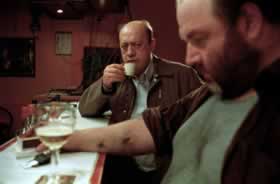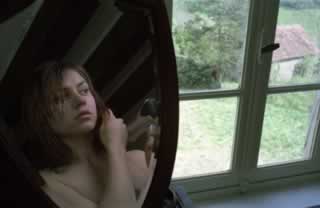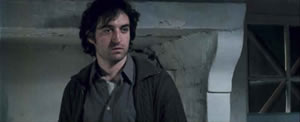 “With a poetic nod to early Polanski films like REPULSION, Alanté Kavaïté uses the sublime story to transport the viewer to a mysterious place where realism and surrealism live side by side and can be heard talking to each other.
“With a poetic nod to early Polanski films like REPULSION, Alanté Kavaïté uses the sublime story to transport the viewer to a mysterious place where realism and surrealism live side by side and can be heard talking to each other.
Charlotte is a sound engineer. After Charlotte’s mother is murdered, she returns home to try and find some answers. As a sound engineer, she uses her equipment to carry out her own investigation. While listening to a recording made in the house where the murder took place, Charlotte discovers a strange phenomenon: sounds from the past blend with sounds from the present helping her unravel the mystery.
FISSURES perfectly combines story and style to produce an explosive effect. It is superbly crafted with finely honed acting and writing creating just the right atmosphere. FISSURES is an adventure, building slowly, drawing us in and ending with a satisfying ride into the surreal.
– Shaz Bennett” From AFI FEST web site
Bijan Tehrani: How did you get the inspiration to make this movie? 
Alante Kavaite: First, I wanted to make a movie about a lose, because I feel it’s a theme that is not treated enough and I realized when I was talking to other people that if you open the door, many, many things come and everyone is waiting to talk but it is like a forbidden theme. It was a necessity for me to do something about it. I had experience lose in my life and I wanted in my first movie to do something very personal. While I was thinking about the lose I told that what I missed most in my memories of the people I had lost was their voices. I realized that I even forgot my mother’s voice. This was a shock for me. I can really tell you that I don’t remember her voice and that’s how the idea of the sounds from the past came from. Then, for me it was important to visualize these sounds because sounds are abstract, so little by little I came to this threads idea. Threads show where the sounds are positioned in the space. They also show what Charlotte has been through and show her evolution and also they represent her mental state. The whole thing looks like a web because for me my film is two sides. It is a personal quest and also a criminal story. The Threads in the movie are the web and Charlotte is like a spider. She is learning who she is and she is learning where she comes from and she is learning who her mother was, because this is something that she has completely missed. By looking back she gets to know herself and becomes stronger to face the future.
 Bijan: The word about you is about your admiration of Roman Polanski movies and that you are compared with him? Is this true?
Bijan: The word about you is about your admiration of Roman Polanski movies and that you are compared with him? Is this true?
Alante: I was much honored when I read that. I love Polanski movies, specially his early movies such as Knife in the water and Repulsion.
Bijan: There filmmakers that try to make their movies poetic; your movie is naturally poetic. Fissures is about crime and a person looking to find about her past and find who may have killed her mother and all these voices come back to her and you put all this in a visual poem.
Alante: I think that we don’t need a lot of things to make poetry. Sometimes you can take very simple items and by creating a certain look for them create poetry. You put two things, like a chair and a red rose together and it turns into poetry. I needed this movie to be very simple and very realistic because I believe we don’t need to exaggerate facts in order to express emotions. Also as the story has this super natural element, it gave me another reason to try to make everything very realistic so that you could believe totally in Charlotte discoveries. If I had started from the beginning with big sounds and scary music I’m sure that it would have broken this phenomenon.
Bijan: One thing that I like about your work is that you respect your audience. You let them have a part in the movie and think about it instead of using music, etc. to tell them what they should feel and think.
to tell them what they should feel and think.
Alante: I’m happy that you say this to me because it is the greatest compliment I have ever heard. This is what the cinema should be. My film is not like big studio movies where everything is explained and shown for you and you just have to sit and watch. I like when you are part of the movie and when you can walk with your imagination. I think people are cleverer and they have more imagination than filmmakers want us to think.
Bijan: That’s quite true. Most of the movies made these days have an expiration date. But movies like Fissures, that are very simple and at the same time very deep should survive longer.
Alante: Thank you. Thank you so much. I’ve made this movie very sincerely. I didn’t think about how much of an audience this movie would make or how long it will last.
 Bijan: Could you tell us about your future projects?
Bijan: Could you tell us about your future projects?
Alante: I have two more projects. They may complete this story. It may be a trilogy about Lost. The first one is about a daughter that loses her mother, the second is about a mother that loses her daughter, and the third one as bout a man that loses his friend. Three different locations, image styles and treatments and I hope I can do this. It seems difficult to finance this theme because when the script was traveling back and forth, many of the distributors told us who would see this film because it is so sad and so heavy. I really hope I can do these films. I’m not sure actually which one will be the second. I want to be free to decide. Also, I think that the film you choose to make chooses its treatment and its theme induces its genre. So maybe for my second film I choose another theme. I always will first choose a theme and then find the best way to express it.
Bijan: Thank you for your time.
FISSURES
ECOUTE LE TEMPS
France, 2006, 87 min, 35 MM
In French with English subtitles
World Premiere
DIR/SCR: Alanté Kavaïté
PROD: Antoine Simkine
DP: Dominique Colin
ED: Agnes Mouchel
PROD DES: Francois Emmanuelli
Cast: Emilie Dequenne, Ludmila Mikaël, Mathieu Demy, Jacques Spiesser

